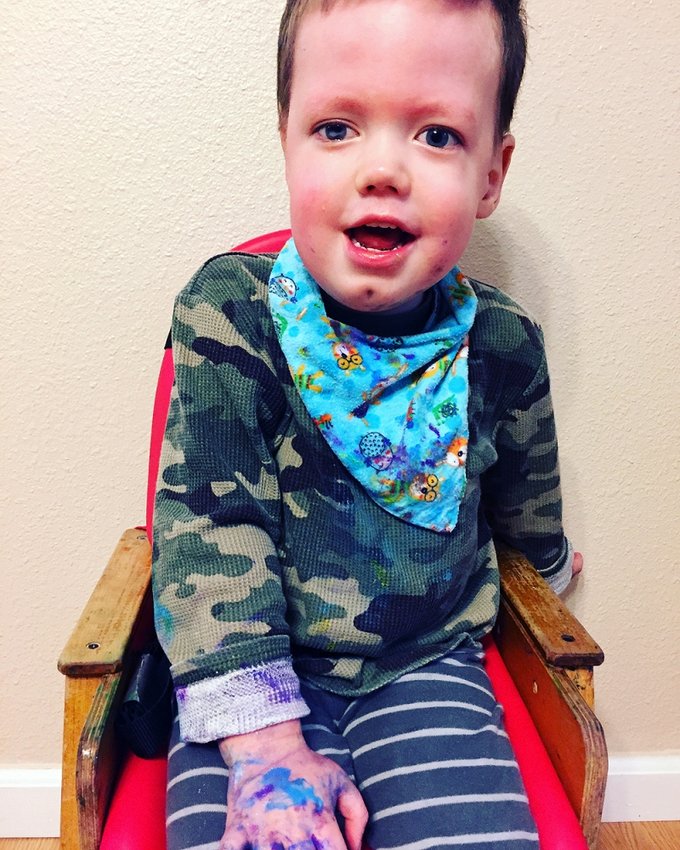 Hudson Hubbell has a serious disease, but seems to always have a smile on his face. Courtesy Sara Hubbell.
Hudson Hubbell has a serious disease, but seems to always have a smile on his face. Courtesy Sara Hubbell.
“Sometimes, a pregnancy just doesn’t go as planned,” said Sara Hubbell. “You enter a whole new world. And we just dove into it.”
Hubbell’s pregnancy and delivery went smoothly, but as soon as Hudson was born, it was clear something was not right. He needed help breathing on his own and his muscle tone was poor. When he was two days old, he was flown by helicopter from Silverdale to Children’s Hospital in Seattle while his parents, Port Orchard residents Sara and Josh, followed by car.
Josh had to return to work, but Sara spent the next six weeks there with Hudson, first staying in a room for parents with babies in the neonatal intensive care unit and later sharing a room with him as the hospital team worked to find out what was wrong and how to get the baby home safely.
Hudson’s main problem was muscle weakness, making it impossible to swallow safely on his own or to breathe normally. When he did go home, it was with a tube through his nose to get food to his stomach and equipment to monitor his breathing and oxygen levels.
It would be two years before the family received a definitive diagnosis.
Hudson’s neurologist suggested a muscle biopsy and the test confirmed his suspicion. Hudson has X-linked myotubular myopathy, a rare genetic disease affecting about one in 50,000 boys. Skeletal muscles—those used for movement—are weak. The severity of the weakness varies from child to child, but it does not worsen over time as in a disease like muscular dystrophy.
The condition is passed from mother to son about 85 percent of the time, but Sara doesn’t have the gene for it. In Hudson’s case, it is a new mutation. He is relatively mildly affected. Most boys don’t live beyond two years, succumbing to pneumonia because they can’t cough and clear infections, but some survive into young adulthood. At this time there is no cure, but clinical trials to test gene therapy as a possible cure are underway.
Because his speech can be hard to understand, the family uses baby sign language. As Hudson gets older, he is beginning to use an iPad as a communication device. At night he is on a bi-pap machine: A mask is placed over his mouth and nose and when he takes a breath, it adds pressure to his inhalation to make sure his lungs expand as much as possible.
Skeletal muscles affect how the spine and other bones and joints develop. Over time, Hudson will likely need treatment for scoliosis and hip problems. He uses a wheelchair to get around, which the family calls his “hot rod,” but he gets tired and they plan to get an electric chair for him soon.
Hudson sees eight medical specialists at Bremerton’s Holly Ridge Center Birth to Three Program, but it is the speech, physical and occupational therapists who see him at home that have been transformative. “Holly Ridge showed me Hudson is his own person,” Sara said. “He gets to decide who he is. It might be in different ways, but there is nothing he can’t do. They taught me that and it’s been wonderful.”
The medical expenses are largely covered by Josh’s insurance through his job at the shipyard and through Medicaid. But one need not covered by insurance is a vehicle that can accommodate Hudson’s electric wheelchair. They found that a Honda Element, with modifications, would work well.
Sara’s cousin started a GoFundMe campaign to raise money for it and Blend Wine Shop in Key Center is dedicating its tip jar to the Hubbell family cause.
Sara hardly remembers Hudson’s first year. “It was almost like PTSD. I was just in survival mode, doing what I had to do.” From that first step seeing Hudson airlifted to Seattle, it’s been quite a journey. Although the future still holds challenges, she is joyful when she talks about her son. She’s had tremendous support from her family and added that she and Josh are not ones to wallow in self-pity. “It’s just not who we are.” Having a diagnosis, so that she and Josh have a better understanding of what to expect, and even the possibility of a cure, has also helped.
Sara was a barista before she had Hudson and still works on Sundays, but is now considering becoming an occupational therapist. She and Josh have known each other since high school and got married last year. They just moved to their own home in Port Orchard—one with no carpets or stairs, so that Hudson can get around more easily. They hope to have a second baby in the next year or so.
Now that Hudson is 3, he will get support services through the South Kitsap School District. Sara hopes that he can attend programs outside their home, but she’ll need to balance the socialization with his risk of getting infections. Even a cold can be potentially life threatening.
“We had no idea when we had Hudson what was ahead of us,” Sara said. “All of the sudden, life was different. Would I have asked for this? No. But would I change who he is? No. He shows me ways to be grateful every day. He’s never known anything else, and he always has a smile on his face.”
A video of Hudson at Holly Ridge Center is at hollyridge.wistia.com/medias/xi8zeuujgl.
The Hubbell GoFundMe page is at www.gofundme.com/hudson-hubbell.
UNDERWRITTEN BY THE FUND FOR NONPROFIT NEWS (NEWSMATCH) AT THE MIAMI FOUNDATION, THE ANGEL GUILD, ADVERTISERS, DONORS AND PEOPLE WHO SUPPORT INDEPENDENT, NONPROFIT LOCAL NEWS